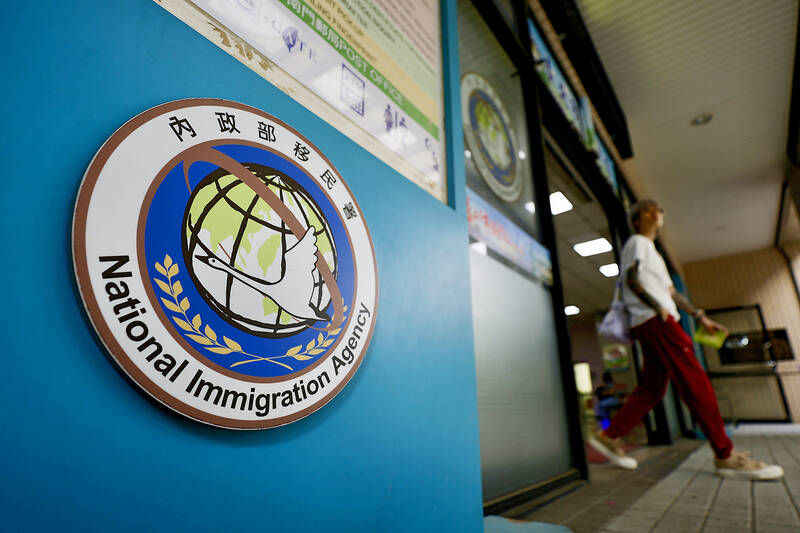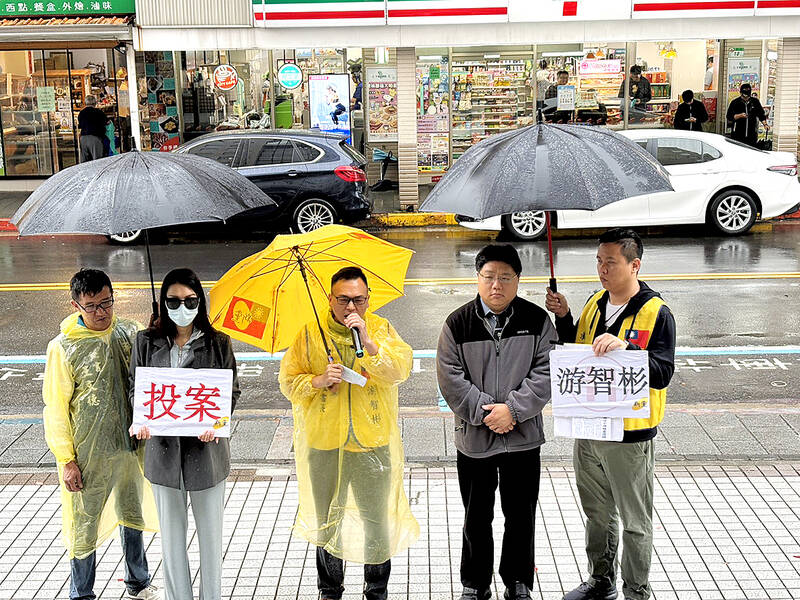Last week, the the National Immigration Agency (NIA) told the legislature that more than 10,000 naturalized Taiwanese citizens from the People’s Republic of China (PRC) risked having their citizenship revoked if they failed to provide proof that they had renounced their Chinese household registration within the next three months.
Renunciation is required under the Act Governing Relations Between the People of the Taiwan Area and the Mainland Area (臺灣地區與大陸地區人民關係條例), as amended in 2004, though it was only a legal requirement after 2000. Prior to that, it had been only an administrative requirement since the Nationality Act (國籍法) was established in 1929.
Deputy Director-General Chen Chen-cheng (陳建成) said that the Taiwanese citizens in violation of the law had been receiving notices to supply the necessary documentation for months.

Photo: Reuters
The notices had been issued long before the government kicked out the notorious three PRC influencers whose dependent-based residency permits it revoked last month for “reunification” comments made online.
Most of the 10,000 people failed to provide documentation because of health problems related to the COVID-19 pandemic and paperwork issues, Chen said.
It’s 2025. Pandemic eased a couple of years ago. It is easy to ask: would any other naturalized citizens be shown such forbearance, permitted to keep their old citizenship for years after naturalizing? But that question is wrong.

Photo: EPA-EFE
No, these 10,000 cases don’t show the government’s leniency or harshness (cue: “Green terror!”) towards PRC citizens. Rather, it shows, once again, the stupidity, rigidity and deep racism of Taiwan’s immigration laws. If Taiwan had a reasonable 5-7 year path to dual citizenship, these people would not be facing onerous and risky returns to the PRC to get paperwork, and the government would not be looking like it has picked a specific population to terrorize.
The Chinese Nationalist Party (KMT) and other PRC-aligned parties lost no time in pouncing. On Thursday last week, New Party Deputy Secretary-General You Chih-pin (游智彬) went to the NIA to “turn himself in,” after being notified that he had failed to provide proof of having renounced his Chinese household registration. He naturalized in 1995, before the requirements. You’s move was a potent political stunt.
KMT caucus whip Fu Kun-chi (傅崐萁) chastised the government, saying that chasing twenty-year-old bureaucratic violations is a violation of human rights. It must be admitted that the KMT knows a thing or two about violating human rights.

Photo: Wang Kuan-jen, Taipei Times
Yes, bad policy always creates bad optics.
THE DUAL DILEMMA
What the government should be doing is giving them all an amnesty and then changing the laws to permit all residents to become Taiwanese. The distortions in Taiwan’s immigration system occur because the government keeps evading the possibility of a dual citizenship path. Hence, it must constantly spawn new categories of immigration exceptions that gradually evolve into permanent problems, like the status of PRC spouses. Similar categories easily come to mind: the stateless children of runaway migrant workers, for instance. The government would rather have thousands of stateless children in Taiwan than offer them what might become dual citizenship.
The lack of a clear, universal dual nationality path is part of the “hypocrisy of sovereignty,” as scholar Isabelle Cheng terms it.
“This hypocrisy is manifested by Taiwan’s flexibility towards Japanese citizens’ unavailability of renunciation, in contrast to Taiwan’s rigidity towards Vietnamese citizens and its pragmatism of using household registration as a make-believe nationality for Chinese citizens,” she notes.
The cross-strait relations act defines PRC spouses as neither foreign nor domestic but “special.” Foreign spouses must relinquish their original nationality, but Chinese spouses are required only to cancel their household registration in China. The PRC, she observes, winks at this practice.
She contrasts this, and Taiwan’s acceptance of Japan’s refusal to permit its people to give up their citizenship, with Vietnam, the Philippines and Indonesia. The latter three accept the PRC’s claim to sovereignty over Taiwan, but treat Republic of China (ROC) sovereignty as real for the purposes of its citizens who wish to acquire ROC citizenship and give up their own.
In ROC practice, foreigners are treated as inferiors who are costly sites of (cultural) contamination and disease that may erode Taiwan’s competitiveness, says Cheng, particularly those from Southeast Asia. That is the reason the government in 2005 added Chinese language proficiency as a prerequisite for naturalization, she observes.
Time has not mellowed that racism. In November of 2024, the Ministry of the Interior (MOI) rejected a petition from thousands of long-term residents asking the government to establish a dual citizenship path.
“If foreign nationals who have lived permanently for five years [in Taiwan] can naturalize without having to prove the loss of their original nationality, it may have a significant negative impact on our country’s finances, social welfare and national security,” the MOI said.
The Taiwan government also imagines that “culture” is an identifiable, eternal, immutable thing whose purity requires that pesky foreigners be kept at arm’s length.
Clearly the government thinks of foreigners as irritants, not participants. If we are so costly, why does Taiwan keep asking for workers from abroad?
POPULATION PROBLEMS
One of the leaders of the rejected dual citizenship petition effort described Taiwan’s most recent demographic statistics on Bluesky the other day: “Taiwan’s population declined by 25,278 people in the first quarter of 2025. Births declined by 7 percent year-on-year. Crude birth rate is down to 5.08 percent. Demographic decline is starting to pick up speed, on track for population decline of 100,000 in 2025, compared to 20,000 in 2024.”
Taiwan’s massive shortage of labor is only going to get worse. The problem is not that people are avoiding work: the February 2025 unemployment rate was the lowest for that month in 25 years. There simply are not enough warm bodies. The government, which has its usual policy of temporary solutions to permanent crises, has mooted bringing in more “migrant workers,” another exceptional category that lies at the intersection of racism and the lack of a dual citizenship path. The mirror category of “migrant worker” is “Gold Card,” another exception created as a dual citizenship dodge.
Dual citizenship is no panacea for Taiwan’s plummeting birthrate and shrinking population, as immigrants do not have significantly more children. But citizenship is an important perk for people looking at countries to work and live in. In fact, one of the PRC citizens just captured in Ukraine said that he had joined the Russian army to obtain Russian citizenship.
If foreign citizenship is considered so valuable that people will risk death in war to obtain it, perhaps the government could get a leg up on competitor states by offering it to people who come to work peacefully in Taiwan.
Notes from Central Taiwan is a column written by long-term resident Michael Turton, who provides incisive commentary informed by three decades of living in and writing about his adoptive country. The views expressed here are his own.

April 14 to April 20 In March 1947, Sising Katadrepan urged the government to drop the “high mountain people” (高山族) designation for Indigenous Taiwanese and refer to them as “Taiwan people” (台灣族). He considered the term derogatory, arguing that it made them sound like animals. The Taiwan Provincial Government agreed to stop using the term, stating that Indigenous Taiwanese suffered all sorts of discrimination and oppression under the Japanese and were forced to live in the mountains as outsiders to society. Now, under the new regime, they would be seen as equals, thus they should be henceforth

Last week, the the National Immigration Agency (NIA) told the legislature that more than 10,000 naturalized Taiwanese citizens from the People’s Republic of China (PRC) risked having their citizenship revoked if they failed to provide proof that they had renounced their Chinese household registration within the next three months. Renunciation is required under the Act Governing Relations Between the People of the Taiwan Area and the Mainland Area (臺灣地區與大陸地區人民關係條例), as amended in 2004, though it was only a legal requirement after 2000. Prior to that, it had been only an administrative requirement since the Nationality Act (國籍法) was established in

With over 100 works on display, this is Louise Bourgeois’ first solo show in Taiwan. Visitors are invited to traverse her world of love and hate, vengeance and acceptance, trauma and reconciliation. Dominating the entrance, the nine-foot-tall Crouching Spider (2003) greets visitors. The creature looms behind the glass facade, symbolic protector and gatekeeper to the intimate journey ahead. Bourgeois, best known for her giant spider sculptures, is one of the most influential artist of the twentieth century. Blending vulnerability and defiance through themes of sexuality, trauma and identity, her work reshaped the landscape of contemporary art with fearless honesty. “People are influenced by

The remains of this Japanese-era trail designed to protect the camphor industry make for a scenic day-hike, a fascinating overnight hike or a challenging multi-day adventure Maolin District (茂林) in Kaohsiung is well known for beautiful roadside scenery, waterfalls, the annual butterfly migration and indigenous culture. A lesser known but worthwhile destination here lies along the very top of the valley: the Liugui Security Path (六龜警備道). This relic of the Japanese era once isolated the Maolin valley from the outside world but now serves to draw tourists in. The path originally ran for about 50km, but not all of this trail is still easily walkable. The nicest section for a simple day hike is the heavily trafficked southern section above Maolin and Wanshan (萬山) villages. Remains of